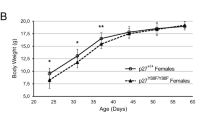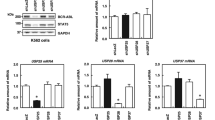Abstract
The Philadelphia chromosome translocation generates a chimeric oncogene, BCR/ABL, which causes chronic myelogenous leukemia (CML). In primary leukemic neutrophils from patients with CML, the major tyrosine phosphorylated protein is CRKL, an SH2-SH3-SH3 adapter protein which has an overall homology of 60% to CRK, the human homologue of the v-crk oncogene. In cell lines transformed by BCR/ABL, CRKL was tyrosine phosphorylated, while CRK was not. We looked for changes in CRK- and CRKL-binding proteins in Ba/F3 hematopoietic cell lines which were transformed by BCR/ABL. Anti-CRK II or anti-CRKL immunoprecipitates were probed by far Western blotting with CRK II- or CRKL-GST fusion proteins to display CRK- and CRKL-coprecipitating proteins. There was a striking qualitative difference in the proteins coprecipitating with CRKL and CRK II. In untransformed cells, three major proteins coprecipitated with CRKL, identified as C3G, SOS and c-ABL. Each of these proteins was found to interact with the CRKL-SH3 domains, but not the SH2 domain. After BCR/ABL transformation, the CRKL SH3-domain binding proteins did not change, with the exception that BCR/ABL now coprecipitated with CRKL. Compared to CRKL, very few proteins coprecipitated with CRK II in untransformed, quiescent cells. After BCR/ABL transformation, both the CRKL- and CRK-SH2 domains bound to a new complex of proteins of approximate molecular weight 105–120 kDa. The major protein in this complex was identified as p120CBL. Thus, in these hematopoietic cell lines, CRKL is involved to a greater extent than CRK II in normal signaling pathways that involve c-ABL, C3G and SOS. In BCR/ABL-transformed cells, CRKL but not CRK II, appears to form complexes which potentially link BCR/ABL, c-ABL, C3G, and SOS to the proto- oncoprotein, p120CBL.
This is a preview of subscription content, access via your institution
Access options
Subscribe to this journal
Receive 12 print issues and online access
$259.00 per year
only $21.58 per issue
Buy this article
- Purchase on Springer Link
- Instant access to full article PDF
Prices may be subject to local taxes which are calculated during checkout
Similar content being viewed by others
Author information
Authors and Affiliations
Rights and permissions
About this article
Cite this article
Uemura, N., Salgia, R., Li, JL. et al. The BCR/ABL oncogene alters interaction of the adapter proteins CRKL and CRK with cellular proteins. Leukemia 11, 376–385 (1997). https://doi.org/10.1038/sj.leu.2400590
Received:
Accepted:
Issue Date:
DOI: https://doi.org/10.1038/sj.leu.2400590
Keywords
This article is cited by
-
Chronic myelogenous leukemia as a paradigm of early cancer and possible curative strategies
Leukemia (2003)
-
Effects of the Tyrosine Kinase Inhibitor Imatinib Mesylate on a Bcr-Abl-Positive Cell Line: Suppression of Autonomous Cell Growth but No Effect on Decreased Adhesive Property and Morphological Changes
International Journal of Hematology (2003)
-
BCR/ABL P190 transgenic mice develop leukemia in the absence of Crkl
Oncogene (2002)
-
Differential expression and signaling of CBL and CBL-B in BCR/ABL transformed cells
Oncogene (2002)
-
Beyond the RING: CBL proteins as multivalent adapters
Oncogene (2001)



